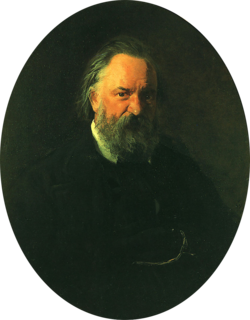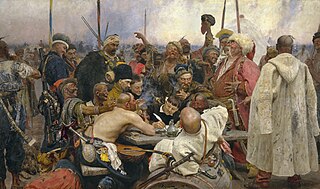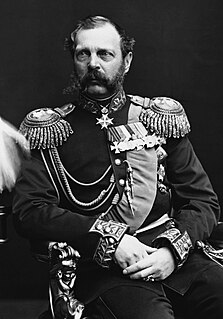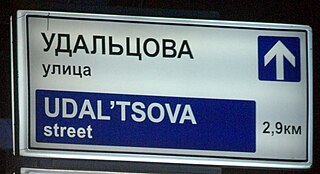
Catherine II, also known as Catherine the Great, born Princess Sophie of Anhalt-Zerbst, was Empress of Russia from 1762 until 1796, the country's longest-ruling female leader. She came to power following a coup d'état which she organized—resulting in her husband, Peter III, being overthrown. Under her reign, Russia was revitalized; it grew larger and stronger and was recognized as one of the great powers of Europe. That said, however, she was a usurper of the Russian throne because her son, Paul I, should have naturally been the Tsar following Peter III’s death.

Serfdom is the status of many peasants under feudalism, specifically relating to manorialism. It was a condition of debt bondage, which developed during the Late Antiquity and Early Middle Ages in Europe and lasted in some countries until the mid-19th century.

Aleksandr Ivanovich Herzen was a Russian writer and thinker known as the "father of Russian socialism" and one of the main fathers of agrarian populism. With his writings, many composed while exiled in London, he attempted to influence the situation in Russia, contributing to a political climate that led to the emancipation of the serfs in 1861. He published the important social novel Who is to Blame? (1845–46). His autobiography, My Past and Thoughts, is often considered the best specimen of that genre in Russian literature.

Praskovia Ivanovna Kovalyova-Zhemchugova also Kovaleva or Kovalyova, Kovaleva-Zhemchugova, Zhemchugova-Sheremeteva, and Sheremeteva or Sheremetyeva was a Russian serf actress and soprano opera singer.

The Emancipation Reform of 1861 in Russia, also known as the Emancipation Edict of Russia,(Russian: Крестьянская реформа 1861 года, translit. Krestyanskaya reforma 1861 goda – "peasants' reform of 1861") was the first and most important of liberal reforms passed during the reign (1855–1881) of Emperor Alexander II of Russia. The reform effectively abolished serfdom throughout the Russian Empire.

The Russian nobility originated in the 14th century. In 1914 it consisted of approximately 1,900,000 members.

In the feudal system, the demesne was all the land which was retained by a lord of the manor for his own use and occupation or support, under his own management, as distinguished from land sub-enfeoffed by him to others as sub-tenants. In England, royal demesne is the land held by the Crown, and ancient demesne is the legal term for the land held by the king at the time of the Domesday Book.

Cholera Riots refers to civil disturbances associated with an outbreak or epidemic of cholera.

The term serf, in the sense of an unfree peasant of the Russian Empire, is the usual translation of krepostnoi krestyanin and stands for an unfree person who, unlike a slave, can be sold only with the land he or she is "attached" to. Historic legal documents of the epoch, such as Russkaya Pravda, distinguished several degrees of feudal dependency of peasants.

A kholop was a feudally dependent person in Russia between the 10th and early 18th centuries. Their legal status was close to that of slaves.

Pugachev's Rebellion of 1773-75 was the principal revolt in a series of popular rebellions that took place in the Russian Empire after Catherine II seized power in 1762. It began as an organized insurrection of Yaik Cossacks headed by Yemelyan Pugachev, a disaffected ex-lieutenant of the Imperial Russian Army, against a background of profound peasant unrest and war with the Ottoman Empire. After initial success, Pugachev assumed leadership of an alternative government in the name of the assassinated Tsar Peter III and proclaimed an end to serfdom. This organized leadership presented a challenge to the imperial administration of Catherine II.

The Moscow uprising of 1648, sometimes known as the salt riot, started because of the government's replacement of different taxes with a universal salt tax for the purpose of replenishing the state treasury after the Time of Troubles. This drove up the price of salt, leading to violent riots in the streets of Moscow. The riot was an early challenge to the reign of Alexei I, eventually resulting in the exile of Alexei's advisor Boris Morozov.1648

Count, then Prince Nikolay Ivanovich Saltykov, a member of the Saltykov noble family, was a Russian Field Marshal and imperial courtier best known as the tutor of the eventual Tsar Paul I of Russia and his two sons, Constantine and Alexander.

The Russian Age of Enlightenment was a period in the 18th century in which the government began to actively encourage the proliferation of arts and sciences, which had a profound impact on Russian culture. During this time, the first Russian university was founded, a library, a theatre, a public museum, as well as relatively independent press. Like other enlightened despots, Catherine the Great played a key role in fostering the arts, sciences, and education. The national Enlightenment in the Russian Empire differed from its Western European counterpart in that it promoted further modernization of all aspects of Russian life and was concerned with abolishing the institution of serfdom in Russia. The Pugachev Rebellion and French Revolution may have shattered the illusions of rapid political change, but the intellectual climate in Russia was altered irrevocably. Russia's place in the world was debated by Denis Fonvizin, Mikhail Shcherbatov, Andrey Bolotov, Ivan Boltin, and Alexander Radishchev; these discussions precipitated the divide between the radical, western, conservative and Slavophile traditions of Russian thought. Intellectuals often used the term prosveshchenie, promoting piety, erudition, and commitment to the spread of learning.

The country of Georgia became part of the Russian Empire in the 19th century. Throughout the early modern period, the Muslim Ottoman and Persian empires had fought over various fragmented Georgian kingdoms and principalities; by the 18th century, Russia emerged as the new imperial power in the region. Since Russia was an Orthodox Christian state like Georgia, the Georgians increasingly sought Russian help. In 1783, Heraclius II of the eastern Georgian kingdom of Kartli-Kakheti forged an alliance with the Russian Empire, whereby the kingdom became a Russian protectorate and abjured any dependence on its suzerain Persia. The Russo-Georgian alliance, however, backfired as Russia was unwilling to fulfill the terms of the treaty, proceeding to annex the troubled kingdom in 1801, and reducing it to the status of a Russian region. In 1810, the western Georgian kingdom of Imereti was annexed as well. Russian rule over Georgia was eventually acknowledged in various peace treaties with Persia and the Ottomans, and the remaining Georgian territories were absorbed by the Russian Empire in a piecemeal fashion in the course of the 19th century.

The Russian Empire, also known as Imperial Russia or simply Russia, was an empire that existed across Eurasia and North America from 1721, following the end of the Great Northern War, until the Republic was proclaimed by the Provisional Government that took power after the February Revolution of 1917.
Forbidden Years were part of a tightening of the service obligations of serfs in Russia leading to full-scale serfdom in the seventeenth through nineteenth centuries. They were first instituted by Tsar Ivan IV in 1581 as a temporary measure, but eventually became permanent.

Like slavery, serfdom has a long history, dating to the Ancient Times.

Alexander II was the Emperor of Russia from 2 March 1855 until his assassination on 13 March 1881. He was also the King of Poland and the Grand Duke of Finland.

















